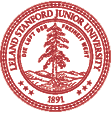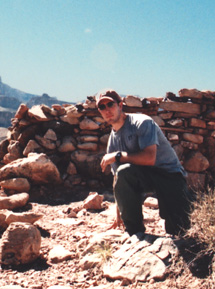








Graduate Students
Sid Carter
Sid’s interest in studying archaeological problems from the perspective of the geosciences originated in his undergraduate education at Dartmouth College, where he majored in classical archaeology modified with earth sciences and conducted honors research on Late Bronze Age Minoan and Mycenaean signet rings. After beginning his graduate career at M.I.T., he entered the Department of Geological and Environmental Sciences (GES) and the Interdisciplinary Archaeology Program at Stanford. Currently a 5th year PhD candidate, Sid has focused his graduate research on understanding the geological sources for the prehistoric ceramic traditions in the Grand Canyon area of northern Arizona. Specifically, he has been evaluating isotopic techniques for ceramic provenance analysis and synthesizing petrographic and isotopic data to constrain potential sources of ceramic raw materials in the Upper Basin of the Coconino Plateau and the eastern inner Grand Canyon. The results of this research are crucial for Sid’s reexamination of the Kayenta Anasazi and Cohonina archaeological groups and models of their interaction.
In addition to geoarchaeology, Sid has a general interest in archaeometry, i.e., the scientific analysis of material culture. As a side project, he has used the analytical facilities of GES and the Department of Materials Science and Engineering to investigate the compositional characteristics of black-painted Anasazi ceramics. Sid advocates more extensive implementation of archaeometric analysis in archaeological research and recognizes a need for an explicit geological orientation in many areas of archaeometry (such as ceramic provenance analysis). Together with Prof. Mahood and Dr. Tristan Carter (Fellow in the Archaeology Program), he hopes to facilitate the use of Stanford’s extensive analytical capabilities by researchers in the Archaeology Program and the Cantor Arts Center.
Sid’s broader intellectual interests include the regional archaeology of the American Southwest, theoretical approaches to landscapes in anthropology and archaeology, and the mediation of multiple forms of archaeological knowledge in academia and cultural resource management.
- Office: Green Earth Sci. 231
- Office Phone: 650-723-5014
- email: swcarter@pangea.stanford.edu
SORT : Stanford Obsidian Research Team
Undergraduate Advisees
Erica Simmons: Origins of amorphous fired clay at Presidio de San Francisco
Collaborators
Prof. Ian Morris
Prof. Ian Hodder
Prof. John Rick
Tristan Carter (Acting Assistant Professor)
Prof. Allan Sullivan (U Cincinati)
Prof. Steven Shackley (UC Berkeley)
